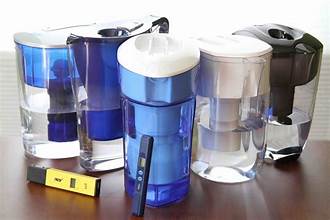The Ultimate Guide to Choosing the Best Water Pitcher Filter for Your Home

Strong 8k brings an ultra-HD IPTV experience to your living room and your pocket.
Clean, great-tasting water is essential for a healthy lifestyle, and having a water pitcher filter in your home is one of the simplest ways to ensure you're drinking the best water possible. With so many options on the market, choosing the right water pitcher filter can be overwhelming. This guide will walk you through the key factors to consider when selecting the best water pitcher filter for your home.
Understanding Your Water Quality
Know Your Water Source: Before diving into the specifics of water pitcher filters, it's important to understand the quality of your water. Is it sourced from a well, a municipal system, or bottled water? Municipal water often contains chlorine, while well water might have higher levels of minerals or potential contaminants like pesticides.
Testing Your Water: Consider getting your water tested to identify any specific contaminants. You can purchase home testing kits or have a sample analyzed by a laboratory. Knowing the contaminants in your water will help you choose a filter that effectively addresses your needs.
Types of Contaminants Water Pitcher Filters Remove
Chlorine and Chloramines: These are commonly found in municipal water supplies and can affect the taste and smell of water. Look for filters that specifically reduce chlorine.
Heavy Metals: Lead, mercury, and cadmium are dangerous contaminants. Choose a filter certified to remove these metals, especially if you live in an older home with lead pipes.
Microorganisms: While most water pitcher filters aren't designed to remove bacteria or viruses, some advanced models can reduce the presence of harmful microorganisms.
Volatile Organic Compounds (VOCs): These include pesticides, herbicides, and other chemicals. Filters with activated carbon are effective at reducing VOCs.
Sediments: If your water has visible particles or is cloudy, a filter that reduces sediments is essential.
Types of Water Pitcher Filters
Activated Carbon Filters: These are the most common and effective for removing chlorine, VOCs, and improving taste. They work by adsorbing contaminants onto the surface of the carbon.
Ion Exchange Filters: These filters are excellent for softening water by exchanging calcium and magnesium ions with sodium or hydrogen ions. They're also effective at reducing heavy metals.
Reverse Osmosis: Although not typically found in water pitcher filters, reverse osmosis is a highly effective method for removing a broad range of contaminants, including dissolved salts, lead, and fluoride.
Multi-Stage Filters: Some water pitchers combine different filtration technologies, such as activated carbon and ion exchange, for more comprehensive water purification.
Filter Lifespan and Replacement Frequency
Lifespan of the Filter: The lifespan of a water pitcher filter can vary from two months to six months, depending on the brand and model. A shorter lifespan might mean the filter is more effective, but it also means more frequent replacements.
Replacement Indicators: Some advanced water pitchers come with electronic indicators that alert you when it's time to replace the filter. If you’re looking for convenience, this feature can be very handy.
Cost of Replacement Filters: Consider the ongoing cost of replacement filters. While the initial purchase price of a pitcher might be low, expensive replacement filters can add up over time.
Capacity and Design
Pitcher Capacity: Consider the size of the pitcher and how much water it can filter at one time. Larger families or those who consume a lot of water daily might need a pitcher with a higher capacity, while single users might prefer a smaller, more compact design.
Design and Fit: Ensure that the pitcher fits well in your refrigerator or on your countertop. Some pitchers are designed with ergonomics in mind, making them easier to handle and pour.
Material: Most pitchers are made from plastic, but look for BPA-free options to ensure your filtered water isn’t exposed to harmful chemicals. Some models offer glass pitchers for those who prefer to avoid plastic altogether.
Certification and Testing
NSF Certification: Always look for filters that are NSF-certified. NSF International is an independent organization that tests and certifies products for public health and safety. An NSF certification ensures the filter has been tested for performance claims.
Brand Reputation: Consider brands with a strong reputation in the water filtration industry. Reviews and ratings can provide insights into the effectiveness and reliability of the pitcher.
Ease of Use and Maintenance
Ease of Assembly and Cleaning: Some pitchers are easier to assemble and disassemble than others, which can make cleaning simpler. Check if the pitcher parts are dishwasher safe.
Filter Replacement Process: Filters that are easy to replace without spilling or requiring tools add to the overall convenience of the product.
Price and Value for Money
Initial Cost vs. Long-Term Cost: While some pitchers might be cheaper initially, consider the long-term costs associated with replacement filters. A slightly more expensive pitcher with cheaper filters might save you money in the long run.
Value-Added Features: Some water pitchers come with additional features like digital displays, ergonomic handles, or fast filtration times. Weigh these features against the cost to determine the best value for your needs.
Environmental Impact
Eco-Friendly Options: Some companies offer recycling programs for used filters, which can reduce your environmental footprint. Look for brands that are committed to sustainability.
Filter Material: Consider the materials used in the filter itself. Some brands are starting to use biodegradable or recyclable materials in their filters.
Top Water Pitcher Filter Brands to Consider
Brita: A household name, Brita offers a wide range of water pitcher filters known for their reliability and affordability.
PUR: PUR filters are praised for their ability to remove a high percentage of contaminants and offer models with innovative features like lead reduction.
ZeroWater: Known for its five-stage filtration system, ZeroWater is one of the few brands that can reduce dissolved solids to zero.
Aquagear: Aquagear filters are NSF-certified for removing a wide range of contaminants, including lead and fluoride, and the company emphasizes eco-friendly practices.
Conclusion
Choosing the best water pitcher filter for your home depends on your specific water quality needs, budget, and lifestyle. By understanding the types of contaminants in your water and knowing what to look for in a filter, you can make an informed decision that ensures your family enjoys clean, safe, and great-tasting water every day. Remember, the right water pitcher filter can make a significant difference in your health and well-being, so take the time to choose wisely.
Note: IndiBlogHub features both user-submitted and editorial content. We do not verify third-party contributions. Read our Disclaimer and Privacy Policyfor details.


